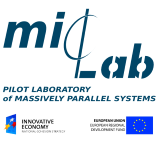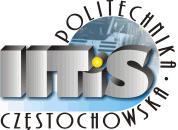Call for papers
CALL FOR PAPERS
PPAM 2015
11th INTERNATIONAL CONFERENCE ON PARALLEL PROCESSING AND APPLIED MATHEMATICS
Krakow, Poland,
September 6-9, 2015
http://ppam.pl
The PPAM 2015 conference, eleven in a series, will cover topics in parallel and distributed computing, including theory and applications, as well as applied mathematics. The focus will be on models, algorithms, and software tools which facilitate efficient and convenient utilization of modern parallel and distributed computing architectures, as well as on large-scale applications, including big data problems.
PPAM is a biennial conference started in 1994, with the proceedings published by Springer in the Lecture Notes in Computer Sciences series. The PPAM Proceedings are indexed in main databases such as Web of Science, SciVerse Scopus, and DBLP. In particular, all the Proceedings of PPAM conferences published in the Springer LNCS series, including the last PPAM 2013 Conference, are covered by the Web of Science.
Next year the PPAM conference will take place in beautiful Krakow, the old capital of Poland, a major national academic, cultural and artistic centre.
The PPAM 2015 conference is organized by Czestochowa University of Technology together with AGH University of Science and Technology, under the patronage of the Committee of Informatics of the Polish Academy of Sciences, in cooperation with the ICT COST Action IC1305 "Network for Sustainable Ultrascale Computing (NESUS)".
Topics of interest include, but are not limited to:
- Parallel/distributed architectures, enabling technologies
- Cluster and cloud computing
- Multi-core and many-core parallel computing
- GPU computing
- Heterogeneous/hybrid computing and accelerators
- Parallel/distributed algorithms: numerical and non-numerical
- Scheduling, mapping, load balancing
- Performance analysis and prediction
- Performance issues on various types of parallel systems
- Autotuning: methods, tools, and applications
- Power and energy aspects of computation
- Parallel/distributed programming
- Tools and environments for parallel/distributed computing
- Security and dependability in parallel/distributed environments
- HPC numerical linear algebra
- HPC methods of solving differential equations
- Evolutionary computing, meta-heuristics and neural networks
- HPC interval analysis
- Applied Computing in mechanics, material processing, biology and medicine, physics, chemistry, business, environmental modeling, etc.
- Applications of parallel/distributed computing
- Methods and tools for parallel solution of large-scale problems, including big data applications
- Large-scale social network analysis
KEYNOTE SPEAKERS (tentative list)
| David A. Bader | Georgia Institute of Technology, USA |
| Costas Bekas | IBM Research - Zurich, Switzerland |
| Pete Beckman | Argonne National Laboratory, USA |
| Christopher Carothers | Rensselaer Polytechnic Institute, USA |
| Barbara Chapman | University of Houston, USA |
| Ewa Deelman | University of Southern California, USA |
| Jack Dongarra | University of Tennessee and ORNL, USA |
| Geoffrey Fox | Indiana University, USA |
| Dieter Kranzlmueller | Ludwig-Maximilians-Universitaet Muenchen, Germany |
| Vladik Kreinovich | University of Texas at El Paso, USA |
| Alexey Lastovetsky | University College Dublin, Ireland |
| Srinivasan Parthasarathy | Ohio State University, USA |
| Enrique S. Quintana-Orti | Universidad Jaime I, Spain |
| Daniel Reed | University of Iowa, USA |
| Rizos Sakellariou | University of Manchester, UK |
| Boleslaw K. Szymanski | Rensselaer Polytechnic Institute, USA |
| Manuel Ujaldon | NVIDIA |
| Jeffrey Vetter | ORNL and Georgia Institute of Technology, USA |
| Richard W. Vuduc | Georgia Institute of Technology, USA |
WORKSHOPS, MINISYMPOSIA, SPECIAL SESSIONS
- Workshop on GPU Computing
- Workshop on Models, Algorithms and Methodologies for Hybrid Parallelism in New HPC Systems
- Workshop on Power and Energy Aspects of Computation
- Workshop on Scheduling for Parallel Computing
- Workshop on Language-Based Parallel Programming Models
- Workshop on Performance Evaluation of Parallel Applications on Large-Scale Systems
- Workshop on Parallel Computational Biology
- Workshop on Applications of Parallel Computation in Industry and Engineering
- Minisymposium of HPC Applications in Physical Science
- Workshop on Applied High Performance Numerical Algorithms in PDEs
- Minisymposium on High Performance Computing Interval Methods
- Workshop on Complex Collective Systems
- Special Session on Efficient Algorithms for Problems with Matrix and Tensor Decompositions
- Special Session on Algorithms, Methodologies and Frameworks for HPC in Geosciences and Weather Prediction
PAPER SUBMISSION AND PUBLICATION
Original papers are invited for the conference. Authors should submit full papers (draft version, PDF file, together with abstract) using the online submission system before April 26, 2015. Regular papers are not to exceed 10 pages (LNCS style). Papers will be refereed and accepted on the basis of their scientific merit and relevance to the conference topics. Abstracts of accepted papers will be available during the conference in form of a brochure. Only papers presented at PPAM 2015 will be included into the proceedings, which will be published after the conference by Springer in the LNCS series. Full camera-ready versions of accepted papers will be required by November 15, 2015.
JOURNAL SPECIAL ISSUES
The authors of the best papers selected by the Program Committee will be invited to submit extended versions of their work to special issues of the following journals: International Journal of High Performance Computing Applications, and Concurrency and Computation: Practice and Experience.
CONFERENCE OFFICE
Czestochowa University of Technology
Dabrowskiego 73, 42-201 Czestochowa, Poland
prof. Roman Wyrzykowski
Phone: +48 668 476 840
Fax: +48 34 3250 589
e-mail: roman@icis.pcz.pl
IMPORTANT DATES
| Submission of Papers: | April 26 May 11, 2015 |
| Notification of Acceptance: | June 5 June 20, 2015 |
| Camera-Ready Papers: | Nov. 15, 2015 |
| Roman Wyrzykowski |
Czestochowa University of Technology, Poland CHAIR OF PROGRAM COMMITTEE |
















